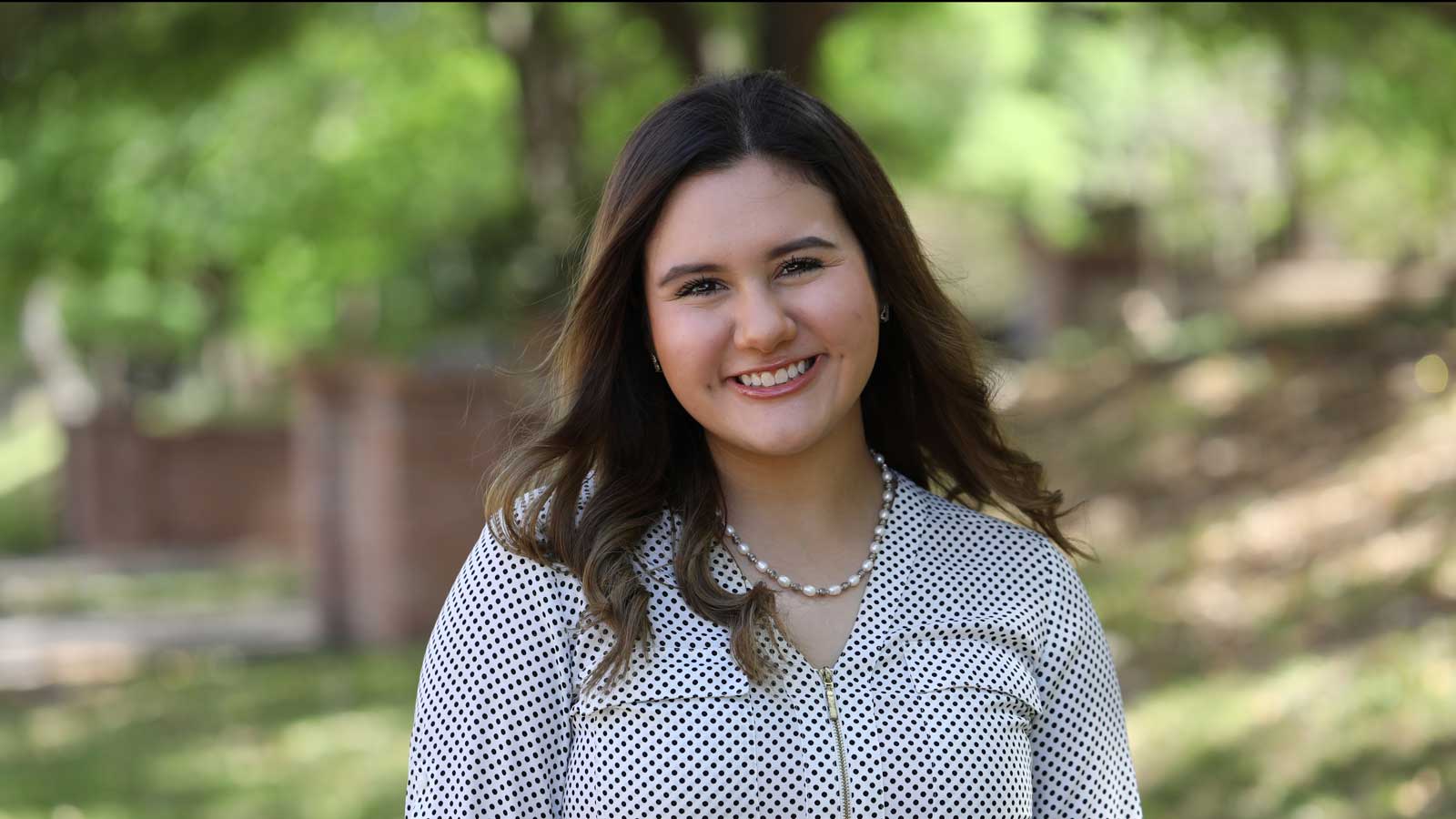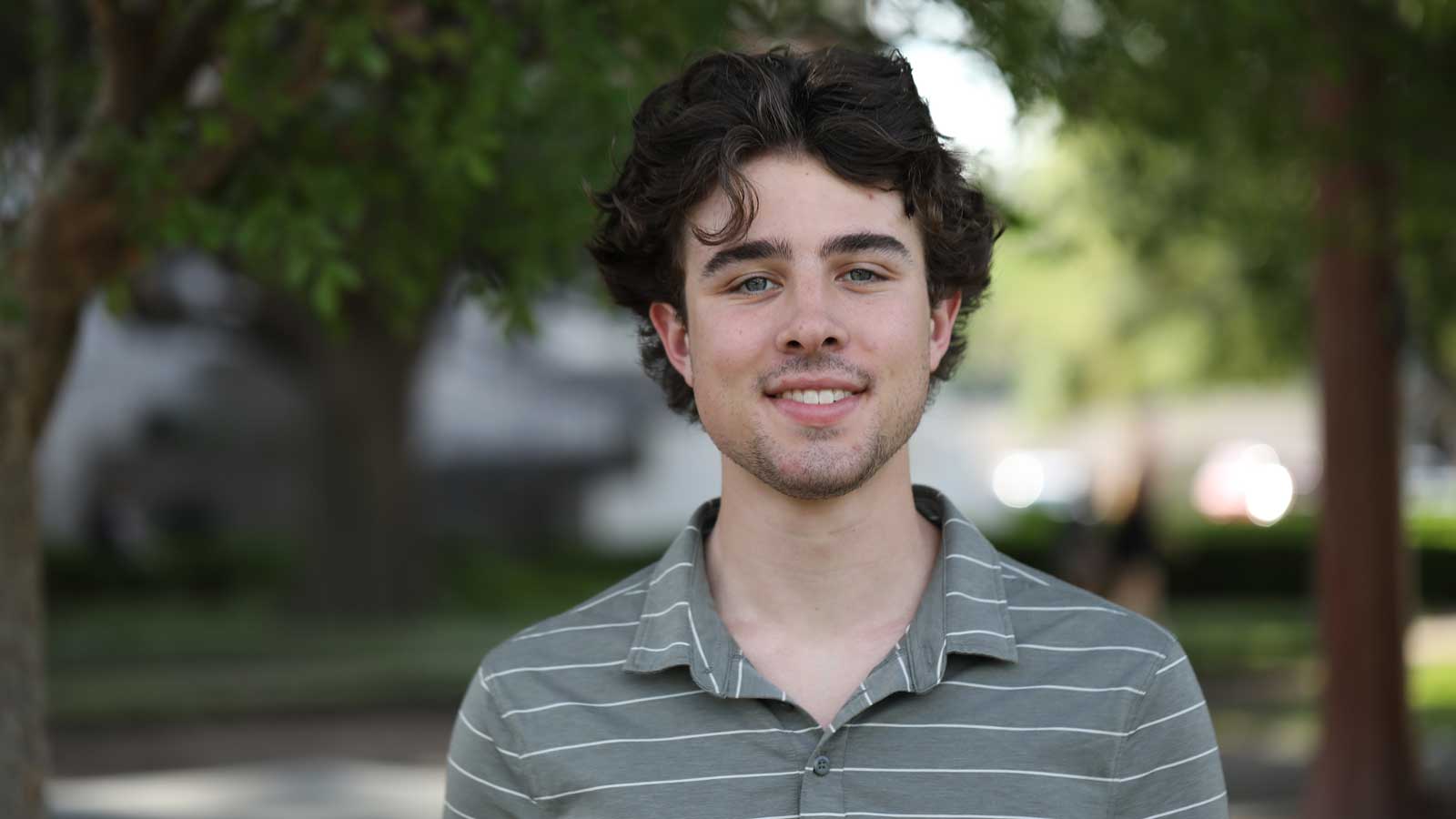First Person: Andrea Vasquez and Nick Imo
Two Arts & Sciences first-gen students write about their experiences coming to Baylor
In the following First Person essays, two current Arts & Sciences majors — Andrea Vasquez and Nick Imo — reflect on their experience coming to Baylor as first-generation students
Finding Family at Baylor
By Andrea Vasquez
“Mija.” This two-syllable, four-letter word ringing in my ears is one I never thought I would miss hearing so much. For those who aren’t quite sure what it means, mija is the Spanish term for “my dear daughter,” and is commonly used in Hispanic households. Growing up I took this word for granted, so the moment I left to attend college and stopped hearing it daily, I knew that meant I was no longer home, in my haven. This was terrifying, because while I knew my family was not any less supportive or emotionally present, the new physical distance between us made me feel disconnected and separated from their lives. This was the first of three major challenges I faced as I arrived at Baylor University in the fall of 2021.
I am a first-generation college student from the border city of El Paso, Texas. At Baylor I am majoring in sociology on the pre-law track, with the hope of one day becoming a criminal lawyer. I am the youngest of my quite large family, and am also the first child with the opportunity to leave my hometown to attend a university.
I am aspiring to enter a competitive field where outside voices are constantly whispering that I cannot succeed, but thankfully, I grew up with the resources to allow me to thrive in my studies thus far with the help of encouragement and grit.
My opportunities in the American education system looked vastly distinct from that of my siblings. When my family immigrated to the United States, my brother and two sisters were already in high school. I was a baby, which meant I didn’t struggle with as many language, cultural and economic barriers growing up.
Because of this, it was hard to relate to my own siblings during my huge transition to college — an opportunity that would have seemed impossible for my family 15 years ago. I felt lucky, and I struggled often with survivor’s guilt — I didn’t understand why I was given such a great opportunity and my parents and siblings weren’t. I didn’t quite understand why Baylor picked me. This was the second major challenge, but not an impossible one. I took advantage and realized it was my duty to make my family proud, and that God would provide along the way. Sure enough, they were and are my primary support system and motivation.
My family and I do everything together. We rejoice and mourn as one. We celebrate each other through hills and valleys. I realized that not everyone around me was as tightly knit together with their families or rooted in their identity as I am. And although that leaves room to appreciate the privilege of having a strong lineage, homesickness seemed to be weighing a lot heavier on my shoulders than it was with my peers at Baylor. I didn’t expect this or know how to cope well with it, and no one around me seemed to be able to relate to what I was experiencing. This was my third challenge.
“I am motivated to encourage other first-gen students to step out and be bold…[they] should be proud of who they are.”Andrea Vasquez
Some other smaller challenges I personally encountered at Baylor included tedious matters such as preparing for move-in, registering for classes and purchasing textbooks. I had no idea how to do any of this and my family didn’t, either. Additionally, not knowing about Greek life on campus once I decided to go through sorority recruitment was stressful. Being a non-legacy, it was frustrating to ask for guidance involving a concept my family knew nothing about. I also did not anticipate the challenge of finding a reliable campus community and discovering my new identity outside of the four walls in my house.
But I have been able to find mentorships and communities here at Baylor. One of the best sources was the First in Line Success Academy (FILSA), which is open to all incoming first-gen students to provide help with the transition to Baylor. Aside from financial support, ›
FILSA provided me with workshops and personalized counseling to support me and my individual needs. I truly felt seen and heard, and I would recommend this program to anyone needing similar support. I couldn’t be more grateful for the encouragement it provided through its intentional design.
While not diminishing the reality of the struggles I faced being a first-gen minority student, FILSA truly accepted me and aided in my transition. Immersing myself in this program allowed me to see my prayers being answered one by one. At the very first workshop, God spoke to me through the wonderful ambassador and graduate student Micah Mitchell. He said, “You are right where you are meant to be.” I will never forget that day and the impact of his words. FILSA has also given me amazing friends and role models such as Michelle Gonzalez and Thracy Arrieche.
My expectations of what college would be like were very different from the reality I found. For example, I did not anticipate the level of academic rigor I found at Baylor. Given that I was at the top of my class in high school, I thought I would have everything in my back pocket in college. But even with help from amazing mentors and support systems, it was a personal struggle for me to accept failure and my imperfect performance at given moments. Being a first-gen student also meant I was under constant pressure.
After my first year here at Baylor, I have grown and changed my perspective so much. I have learned to seek progress — not perfection. I have also found a number of encouraging communities here, including those at St. Peter’s Catholic Student Center, in Campus Living & Learning, in Baylor & Beyond (where I became a Community Leader), in Student Government, in my sorority, Alpha Chi Omega, and most importantly, in the community of fellow first-gen students at Baylor.
I am motivated to encourage other first-gen students to step out and be bold. My fellow first-gens should be proud of who they are and the hard work that has brought us all to Baylor. That’s step one. And don’t be like those who might underestimate the impact that first-gen students can have on the community, because we have some of the most beautiful, heartfelt stories to tell.Finally, it’s also important to never forget where you come from. Your familia is a big part of your story, so don’t hide them. Find bliss in sharing this journey with them as well. Be patient and don’t get discouraged. But most of all, it is crucial that you believe you are right where you are meant to be. God will continue to work for you and through you at this amazing institution.
Proud to be First Generation
By Nick Imo
Being a first-generation college student can come with a lot of anxiety and pressure, but luckily my experience at Baylor has been extremely embracive. For reference, I am a sophomore who not long ago finished my first year here. My dad didn’t attend college, and my mom wasn’t able to finish college because her parents died at a young age, leaving her unable to afford the price of tuition on her own. Knowing all this when coming into college can create immense pressure generating the feelings of needing to prove yourself.
After being accepted to Baylor and learning about different scholarships, I discovered a scholarship for first-generation students. Little did I know that this was more than just a scholarship. Its official name is the First in Line program at Baylor. After I was accepted, First in Line director Michelle Gonzalez reached out to me and right off the bat I felt welcomed. I started to realize that this was much more than scholarship money being granted to me, but it was a whole program geared to supporting me and other first-generation students at Baylor.
As my freshman year began, all the new First in Line members were asked to come to move-in a couple of days before the official starting date to get settled in and see what First in Line is all about. When I got to campus an older member from First in Line helped my family and I move into my dorm. Then, after I got settled and said goodbye to my parents, I and the other First in Line members had our first meeting. I was introduced to Michelle and then was assigned to a peer leader and small group — whom I would join for monthly meetings to check up on our well-being. Within those first few days of meeting with the First in Line group before school started, I never felt better about being a first-generation student.
“I started to realize that this was much more than scholarship money being granted to me, but it was a whole program geared to supporting me and other first-generation students.”Nick Imo
I saw how much First in Line wanted me to succeed and thrive at Baylor. At the meetings, we were given resources, stories and compassion — not to mention that First in Line allowed us to meet and bond with earlier groups of first-generation students. Being able to interact with people who are going through a similar situation can make all the difference. I no longer felt I was in this alone. I truly felt I was in the right place and knew that choosing First in Line was a great decision.
Most of the time when I tell others that I am a first-generation student they look surprised. I feel like the first-generation label can sometimes lead to stereotyping first-gen students as lost people on the verge of dropping out of school. So, when peers learn that I’m first-generation they might assume that I am struggling. I will say it is hard being first-generation, especially at a big university like Baylor due to its rigorous academics and large campus, but that doesn’t define who I am. When given the right support and encouragement, a person can achieve anything.
I’m so grateful that Baylor and First in Line have given me such a positive experience and, most importantly, a place where I am proud to say I’m first-generation.

